小学英语句型转换
小学英语句型转换整理
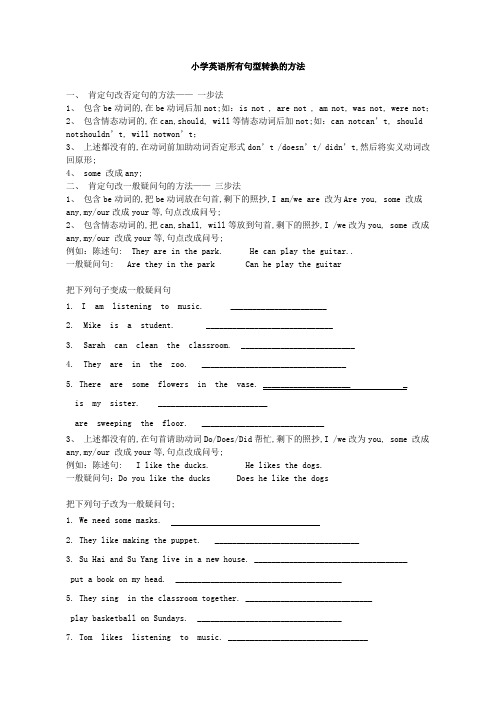
小学英语所有句型转换的方法一、肯定句改否定句的方法——一步法1、包含be动词的,在be动词后加not;如:is not , are not , am not, was not, were not;2、包含情态动词的,在can,should, will等情态动词后加not;如:can notcan’t, should notshouldn’t, will notwon’t;3、上述都没有的,在动词前加助动词否定形式don’t /doesn’t/ didn’t,然后将实义动词改回原形;4、 some 改成any;二、肯定句改一般疑问句的方法——三步法1、包含be动词的,把be动词放在句首,剩下的照抄,I am/we are 改为Are you, some 改成any,my/our改成your等,句点改成问号;2、包含情态动词的,把can,shall, will等放到句首,剩下的照抄,I /we改为you, some 改成any,my/our 改成your等,句点改成问号;例如:陈述句: They are in the park. He can play the guitar..一般疑问句: Are they in the park Can he play the guitar把下列句子变成一般疑问句1. I am listening to music. ______________________2. Mike is a student. _____________________________3. Sarah can clean the classroom. __________________________4. They are in the zoo. _________________________________5. There are some flowers in the vase. ____________________ _is my sister. _________________________are sweeping the floor. ____________________________3、上述都没有的,在句首请助动词Do/Does/Did帮忙,剩下的照抄,I /we改为you, some 改成any,my/our 改成your等,句点改成问号;例如:陈述句: I like the ducks. He likes the dogs.一般疑问句:Do you like the ducks Does he like the dogs把下列句子改为一般疑问句;1. We need some masks.2. They like making the puppet. _________________________________3. Su Hai and Su Yang live in a new house. ___________________________________put a book on my head. ______________________________________5. They sing in the classroom together. _____________________________play basketball on Sundays. _________________________________7. Tom likes listening to music. ________________________________三、肯定句改特殊疑问句的方法——四步法1、句首添加特殊疑问词根据划线部分确定是什么疑问词;2、划线部分去掉;3、把剩下的句子按照改一般疑问句的方法改完;特例:How many询问数量后紧接物品,EG: How many kites can you see/ How many books are there on the desk 等4、查补某些特殊的句型需要添词或减词;句号改成问号;句型转换题1. The girl is singing in the classroom.改为否定句改为一般疑问句2. They are looking for bag.对画线部分提问3. I am riding my bike now.同上4. There are twelve studens over there.同上5. I can speak English.改为一般疑问句6. I am writing now.同上7. I have a desk and a chair.用He做主语改写句子8. She is buying some food in the supermarket.改为否定句9. I am ill. 对画线部分提问10. Does she like growing flowers 给予否定回答11. I will make model planes with my classmates on Sunday. 对画线部分提问12. The girl dances beautifully.改为感叹句13. The waiter and the waitress play table tennis every day. 改为否定句14. The boy is standing on the man's shoulders.改为一般疑问句15. It's ten o'clock.对画线部分提问关于特殊疑问词组针对人提问谁 /何人 who 地点何地 where 原因 why时间何时 when what time 方式方法程序怎样 how年龄 how old 体重 how heavy 长度 how long 身高 how tall可数名词问多少 How many 不可数名词问多少,多少钱 How much东西职业事物什么 what颜色 what color 时刻 what time选择某一个 which练一练1、A: _______ is the boy in blue B:He’s Mike.2、A: _______ pen is it B:It’s mine.3、A: _______ is the diary B:It’s under the chair.4、A: is the Chirstmas DayB: It’s on the 25th of December.5、A: _______ are the earphones B:They are 25 yuan.6、A: _______ is the cup B:It’s blue.7、A: _______ is it today B:It’s Sunday.8、A: _______ was it yesterday B: It was the 13th of October.9、A: _______ this red one B:It’s beautiful.10、A: Can I have some paper and some crayonsB: _______ A: I want to make a kite.12、A:_______ is your cousin B: He’s 15 years old.13、A:_______ do you have dinnerB: At 6 o’clock.1.He does well in Maths. 改为否定句2.Mike runs as fast as Ben. 改为一般疑问句3.I get up at six thirty every day. 用yesterday morning every day is good at English and Maths. 对画线部分提问5.Ben runs fast. I run faster. 两句合并为一句6. The policeman caught the thief. 改为一般疑问句,作否定回答7.He is thirty kilos. 对画线部分提问8.Turn right at the third crossing. 改为否定句9.Are they American cars 改为单数10.Don’t go along this street.改为肯定句11.Give the purse to me. 换一种说法,句意不变12.The policeman caught the thief. 改问现在进行时13. I get to the shopping center by bus. 对画线部分提问14.It always rains in summer there. 改为一般疑问句,作肯定回答15.It’s cold in winter there. 对画线部分提问16.I like autumn best. 改为否定句17.Su Yang is asking Ben some questions. 对画线部分提问18.Please turn off the light. 改为否定句know his telephone number. 改为一般疑问句20.The children have school today. 改为否定句’d like to join them.改为一般疑问句are going to see a film tomorrow. 对画线部分提问like collecting stamps and singing. 改为否定句24.He often cleans his bedroom. 改为一般疑问句25. Liu Tao is watering flowers in the garden. 对画线部分提问26.David and Mike are going to planting trees this afternoon. 对画线部分提问27.He did his homework in the classroom. 改为否定句Bing is heavier than Gao Shan. 对画线部分提问jumps as far as Mike. 改为否定句see a man behind me. 改为一般过去时boy can jump higher than the girl. 改为否定句is hot in summer in New York. 对画线部分提问34.Liu Ting needs some pencils. 改为否定句35.She is an English girl. 变为复数36.They are our women doctors. 变为单数37.Mary can fly. 变为一般疑问句,并作否定回答38.I like playing football. 改成第三人称单数he39.He has a brother. 改为一般疑问句40.Nancy drew some pictures yesterday. 改为否定句41. Liu Tao usually reads newspaper. 改为过去时1.The children had a good time in the park. 否定句:______________________________2.一般疑问句:_____________________________________3.2. There were about nine hundred people at the concert音乐会. 否定句:_____________________________________ 一般疑问句:_____________________________________ 对划线部分提问:____________________________________4.There was only one problem. 否定句:_____________________________________一般疑问句:_____________________________________肯定/否定回答:____________________________________5.Ann did her homework yesterday evening. 否定句:_______________________________一般疑问句:_____________________________________对划线部分提问:____________________________________st week I read an English book. 否定句:_____________________________________一般疑问句:_____________________________________肯定/否定回答:____________________________________ 对划线部分提问:____________________________________7.My brother was in the park just now. 否定句:__________________________________一般疑问句:_____________________________________ 肯定/否定回答:____________________________________ 对划线部分提问:____________________________________8.She had some bread for lunch today. 否定句:____________________________________ 一般疑问句:_____________________________________肯定/否定回答:____________________________________9.They read English last night. 否定句:__________________________________________ 一般疑问句:________________________________________ 肯定/否定回答:____________________________________ 对划线部分提问:____________________________________。
小学英语句型转换方法+口诀大全
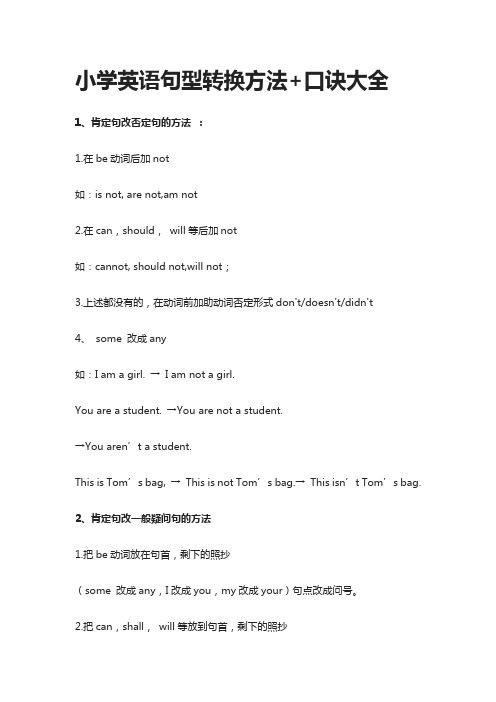
小学英语句型转换方法+口诀大全1、肯定句改否定句的方法:1.在be动词后加not如:is not, are not,am not2.在can,should,will等后加not如:cannot, should not,will not;3.上述都没有的,在动词前加助动词否定形式don't/doesn't/didn't4、some 改成any如:I am a girl. →I am not a girl.You are a student. →You are not a student.→You aren’t a student.This is Tom’s bag, →This is not Tom’s bag.→This isn’t Tom’s bag.2、肯定句改一般疑问句的方法1.把be动词放在句首,剩下的照抄(some 改成any,I改成you,my改成your)句点改成问号。
2.把can,shall,will等放到句首,剩下的照抄(some 改成any,I改成you,my改成your)句点改成问号。
3.上述都没有的,在句首请助动词Do/Does/Did帮忙,剩下的照抄,(some 改成any,I改成you,my改成your,)句点改成问号注意:句首的第一个字母要大写,句尾标点应为“?”如:I am in Class 6. →Are you in Class 6?You are from America.→Are you from America?It is an orange. →Is it an orange?4、就一般疑问句回答一般疑问句有两种回答,即:肯定回答和否定回答。
其中,肯定回答用yes,否定回答用no。
语句顺序为:Yes + 主语+ am /is/ are/was/were.|can.|do/does/did|;No + 主语+ am not/ isn’t/ aren’t 如:—Are you an English teacher?→Yes, I am. /No, I am not.—Is that a bird?→Yes, it is./ No, it isn’t.3、对划线部分提问“就划线部分提问”是小学阶段英语学习的难点,但是一旦掌握了规律,就变得容易多了。
小学生英语句型转换练习题

小学生英语句型转换练习题### 小学英语句型转换练习题题目一:一般疑问句转换1. 原句:I am a student.- 转换:Are you a student?2. 原句:She has a cat.- 转换:Does she have a cat?3. 原句:They play soccer on weekends.- 转换:Do they play soccer on weekends?题目二:特殊疑问句转换1. 原句:My father works in a bank.- 转换:Where does your father work?2. 原句:We usually have lunch at twelve.- 转换:What time do you usually have lunch?3. 原句:The new movie is very interesting.- 转换:How is the new movie?题目三:否定句转换1. 原句:I like apples.- 转换:I don't like apples.2. 原句:She can swim.- 转换:She can't swim.3. 原句:They are at home.- 转换:They are not at home.题目四:陈述句转换为一般疑问句1. 原句:The cat is under the table.- 转换:Is the cat under the table?2. 原句:He is doing his homework.- 转换:Is he doing his homework?3. 原句:We are going to the park tomorrow.- 转换:Are you going to the park tomorrow? 题目五:陈述句转换为否定句1. 原句:She watches TV every evening.- 转换:She doesn't watch TV every evening.2. 原句:They are playing basketball.- 转换:They are not playing basketball.3. 原句:I have a new book.- 转换:I don't have a new book.题目六:反意疑问句1. 原句:He is a good student, isn't he?- 转换:He isn't a good student, is he?2. 原句:She can speak English, can't she?- 转换:She can't speak English, can she?3. 原句:They are going to the concert, aren't they?- 转换:They aren't going to the concert, are they?题目七:被动语态转换1. 原句:We make the cake.- 转换:The cake is made by us.2. 原句:They clean the room.- 转换:The room is cleaned by them.3. 原句:She writes a letter.- 转换:A letter is written by her.题目八:条件句转换1. 原句:If it rains, we will stay at home.- 转换:We will stay at home if it rains.2. 原句:If she has time, she will help us.- 转换:She will help us if she has time.3. 原句:If they finish their homework, they can go out. - 转换:They can go out if they finish their homework.通过这些练习题,小学生可以更好地掌握英语句型的转换,提高语言运用的灵活性和准确性。
小学英语句型转换技巧汇总

小学英语句型转换技巧汇总一、肯定句改否定句1.在be动词/情态动词(can/should/will/may等)后+not 肯定句:I am a student.否定句:I am not a student.肯定句:You are sad.否定句:You are not sad.肯定句:I can swim.否定句:I can not swim.肯定句:You will go to the park.否定句:You will not go to the park.2.在动词前加助动词否定形式don't/doesn't/didn't①当句中的动词是原形时,加don't。
肯定句:I like English.否定句:I don't like English.肯定句:You have dinner.否定句:You don't have dinner.②当句中的动词是第三人称单数时,用doesn't+词原形。
肯定句:She likes singing.否定句:She doesn't like singing.肯定句:She does her homework.否定句:She doesn't do her homework.③当句中的动词是过去式时,用didn't+动词原形肯定句:We had a great time during our holidays.否定句:We didn't have a great time during our holidays.3.当出现动词have/has时,应分情况讨论。
①当have表示“某人有什么的时候”,其否定形式为have not/has not.肯定句:She has two books.否定句:She has not two books.②当have作为实意动词时,其否定形式为do not have/does not have.肯定句:You have dinner.否定句:You do not have dinner.③当have在完成时中作为助动词时,其否定形式为have not/has not.肯定句:I have seen this film.否定句:I have not seen this film.4.肯定陈述句中的some/too,在否定陈述句中应改为any/either。
小学英语所有句型转换的方法

小学英语所有句型转换的方法小学学过的时态有一般现在时、一般过去时、一般将来时、现在进行时、情态动词can,句型有陈述句(包括肯定句,否定句)、疑问句(包括一般疑问句、特殊疑问句)、祈使句(包括肯定句,否定句)、感叹句(包括以How和What 开头的感叹句),虽然句型很多,但是基本助动词只有三个:be, do, have, 他们没有词汇意义,只有语法作用,如协助构成各种时态的否定句、疑问句、祈使句等。
一、肯定句改否定句的方法:一步法1、在be动词后加not。
如:is not ,are not(=aren’t),am not,was not (=wasn’t),were not(=weren’t);2、在can,should,will,have,has等后加not。
如:cannot(=can’t),should not(=shouldn’t),will not(=won’t);3、上述都没有的,在动词前加助动词否定形式don’t,doesn’t或didn’t。
4、some 改成any,and 改成or。
二、肯定句改一般疑问句的方法:三步法1、把be动词放在句首,剩下的照抄,(some 改成any,my改成your等)句号改成问号(.->?)。
2、把can,shall,will,have,has等放到句首,剩下的照抄,(some 改成any,and 改成or。
I,we,my 改成you,your等)句号改成问号。
例如:陈述句:They are in the park. He can play the guitar.一般疑问句:Are they in the park? Can he play the guitar?把下列句子变成一般疑问句1. I am listening to music._ I am not listening to music._2. Mike is a pupil._ Mike isn’t a pupil._3. Sarah can clean the classroom._ Sarah can’t clean the classroom._4. They are in the zoo._ They are n’t in the zoo. __5. There are some flowers in the vase._ There aren’t some flowers in the vase._6.This is my sister._ This isn’t my sister.__7.We are sweeping the floor._ We aren’t sweeping the floor.__3、上述都没有的,在句首请助动词Do/Does/Did帮忙,剩下的照抄,(some 改成any ,and 改成or,I,we,my 改成you,your等)句号改成问号(.->?)。
小学英语【常考句型转换】方法大全
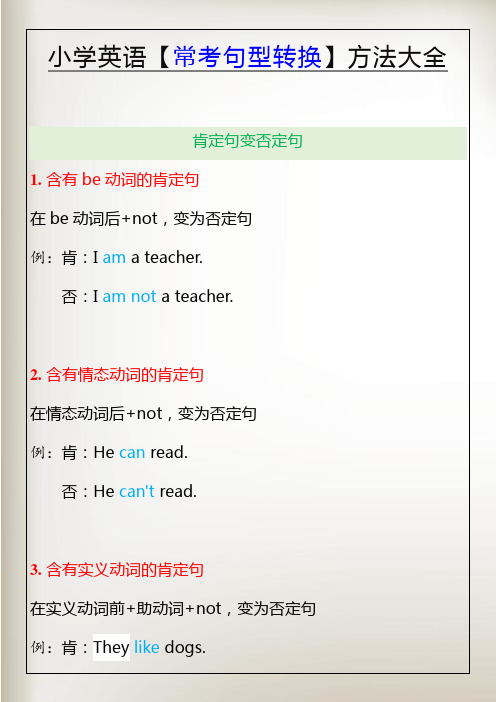
小学英语【常考句型转换】方法大全
肯定句变否定句
1.含有be动词的肯定句
在be动词后+not,变为否定句
例:肯:I am a teacher.
否:I am not a teacher.
2.含有情态动词的肯定句
在情态动词后+not,变为否定句
例:肯:He can read.
否:He can't read.
3.含有实义动词的肯定句
在实义动词前+助动词+not,变为否定句
例:肯:They like dogs.
否:They don't like dogs.
4.肯定句中含有some时
变为否定句,除了+not,还要把some变成any
例:肯:There are some books in the bag.
否:There are n't any books in the bag.
肯定句变一般疑问句
1.含有be动词的肯定句
把be动词提到句首,其它照搬,句号变问号碰到第一、二人称时,要互换。
例:肯:I am a teacher.
否:Are you a teacher?
2.含有情态动词的肯定句
把情态动词提到句首,其它照搬,句号变问号。
小学英语句型转换

5.Is Kangkang a student? Yes , he is. No , he isn’t.
6.Is that a girl? Yes , it is . No , it isn’t.
7.Are those telephones? Yes , they are . No , they aren.’t
小学英语句型转换
此课件下载可自行编辑修改,供参考! 感谢你的支持,我们会努力做得更好!
7. Maria comes from Cuba.
Maria doesn’t come from Cuba.
8. We know Maria. We don’t know Maria.
小学英语句型转换
练习:将下列句子变成一般疑问句。
1. I am a teacher.
Are you a teacher?
肯定句 否定句 疑问句 一般疑问句 特殊疑问句
小学英语句型转换
1.含Be动词的句子
肯定句:主语+be动词+其他. 否定句:主语+be动词+not+其他. 疑问句:Be动词+主语+其他?
小学英语句型转换
一提、二变、三问号
? Is Hhe is a student .
一提、二变、三问号
? Are Tthheeyy are teachers .
6. He likes Chinese. Does he like Chinese?
7. Maria comes from Cuba.
Does
Mariபைடு நூலகம் come
8.We speak Chinese. Do
from Cuba?
小学五年级英语句型转换练习
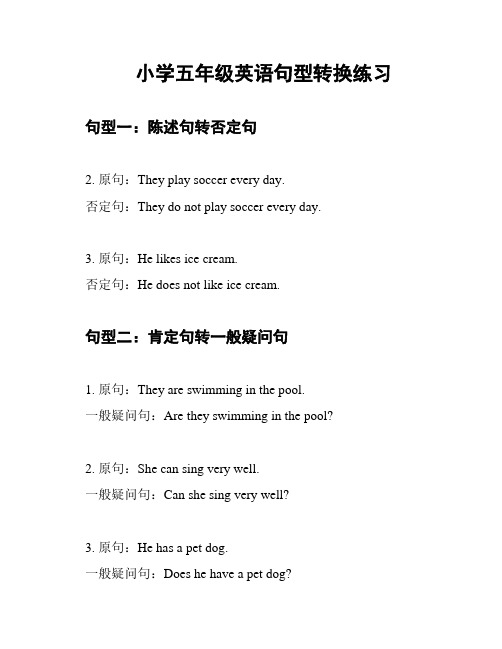
小学五年级英语句型转换练习句型一:陈述句转否定句2. 原句:They play soccer every day.否定句:They do not play soccer every day.3. 原句:He likes ice cream.否定句:He does not like ice cream.句型二:肯定句转一般疑问句1. 原句:They are swimming in the pool.一般疑问句:Are they swimming in the pool?2. 原句:She can sing very well.一般疑问句:Can she sing very well?3. 原句:He has a pet dog.一般疑问句:Does he have a pet dog?句型三:陈述句转选择疑问句1. 原句:They will go to the park or the beach.选择疑问句:Will they go to the park or the beach?2. 原句:She wants to eat pizza or burger.选择疑问句:Does she want to eat pizza or burger?3. 原句:He likes to play basketball or football.选择疑问句:Does he like to play basketball or football? 句型四:一般疑问句转肯定回答和否定回答1. 原问句:Are they going to school?肯定回答:Yes, they are.否定回答:No, they are not.2. 原问句:Can she swim in the river?肯定回答:Yes, she can.否定回答:No, she cannot.3. 原问句:Do you like chocolate ice cream? 肯定回答:Yes, I do.否定回答:No, I do not.句型五:陈述句转感叹句1. 原句:It is a beautiful day.感叹句:What a beautiful day!2. 原句:She is a talented singer.感叹句:What a talented singer she is!3. 原句:He won the first prize.感叹句:What a great achievement he has!。
五年级英语句型转换

五年级英语句型转换一、肯定句转否定句1.添加否定词,如“not”、“no”等。
2.改变谓语动词,如使用“be not”、“do not/doesn’t/didn’t”等。
二、否定句转肯定句1.删除否定词,如“not”、“no”等。
2.转换谓语动词,如使用“be”、“do/does/did”等。
三、陈述句转疑问句1.将谓语动词提前,并在句末添加问号。
2.将陈述句中的主语和谓语颠倒,并在句末添加问号。
四、疑问句转陈述句1.将疑问句中的谓语动词提前,并删除问号。
2.将疑问句中的主语和谓语颠倒,并删除问号。
五、一般现在时转一般过去时1.将谓语动词变为过去时态,如“was”、“were”、“did”等。
2.改变时间状语,如将“now”变为“then”,将“today”变为“yesterday”等。
六、现在进行时转过去进行时1.将谓语动词变为过去进行时态,如“was/were being”等。
2.改变时间状语,如将“now”变为“then”,将“this week”变为“that week”等。
七、现在完成时转过去完成时1.将谓语动词变为过去完成时态,如“had done”等。
2.改变时间状语,如将“so far”变为“by then”,将“until now”变为“until then”等。
八、直接引语转间接引语1.删除直接引语中的引号,并改变人称代词。
2.将直接引语中的谓语动词变为间接引语的谓语动词形式。
3.改变时间状语和地点状语。
4.根据需要添加连词。
九、简单句转复合句1.在简单句中添加从句引导词和从句部分。
2.将简单句中的内容转移到从句中。
四年级英语句型转换方法归纳

四年级英语句型转换方法归纳
英语句型转换是小学英语学习中一个重要的语法点,主要有以下几种类型:
1. 肯定句变否定句:在 be 动词、助动词或情态动词后加 not。
例如:I am a student. → I am not a student.
She can swim. → She cannot swim.
2. 陈述句变一般疑问句:将 be 动词、助动词或情态动词提前,其他部分不变。
例如:He is my teacher. → Is he your teacher?
I like apples. → Do you like apples?
3. 对划线部分提问:根据划线部分确定疑问词,将疑问词放在句首,其他部分变为一般疑问句。
例如:My name is Tom. → What is your name?
I like English. → What subject do you like?
4. 肯定句变特殊疑问句:疑问词+一般疑问句语序。
例如:She is a doctor. → What does she do?
It is five o'clock. → What time is it?
5. 陈述句变感叹句:How+形容词或副词+主语+谓语!
例如:She is beautiful. → How beautiful she is!
He runs fast. → How fast he runs!。
小学英语句型转换题及答案
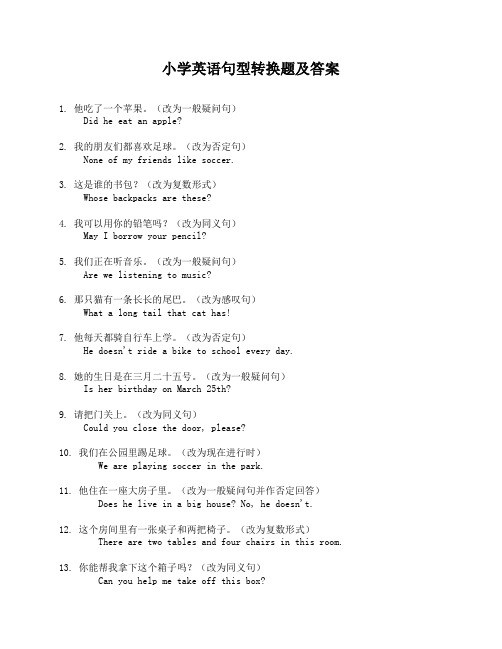
小学英语句型转换题及答案1. 他吃了一个苹果。
(改为一般疑问句)Did he eat an apple?2. 我的朋友们都喜欢足球。
(改为否定句)None of my friends like soccer.3. 这是谁的书包?(改为复数形式)Whose backpacks are these?4. 我可以用你的铅笔吗?(改为同义句)May I borrow your pencil?5. 我们正在听音乐。
(改为一般疑问句)Are we listening to music?6. 那只猫有一条长长的尾巴。
(改为感叹句)What a long tail that cat has!7. 他每天都骑自行车上学。
(改为否定句)He doesn't ride a bike to school every day.8. 她的生日是在三月二十五号。
(改为一般疑问句)Is her birthday on March 25th?9. 请把门关上。
(改为同义句)Could you close the door, please?10. 我们在公园里踢足球。
(改为现在进行时)We are playing soccer in the park.11. 他住在一座大房子里。
(改为一般疑问句并作否定回答)Does he live in a big house? No, he doesn't.12. 这个房间里有一张桌子和两把椅子。
(改为复数形式)There are two tables and four chairs in this room.13. 你能帮我拿下这个箱子吗?(改为同义句)Can you help me take off this box?14. 她正在做作业。
(改为否定句)She is not doing homework.15. 这是我的自行车。
(改为一般疑问句)Is this my bicycle?16. 我的弟弟每天早上六点起床。
小学英语各种句型转换的方法

小学英语各种句型转换的方法1. 直接转换句型直接转换句型是指将一个句子从一种结构转换到另一种结构,而不改变句子的意思。
以下是一些常见的直接转换句型:1.1. 陈述句转疑问句将一个陈述句转换为疑问句的方法是在句首加上相应的疑问词(如who, what, where, when, why, how等),并调整动词的位置。
例如:- She is a teacher. → Is she a teacher?- They have a dog. → Do they have a dog?1.2. 肯定句转否定句将一个肯定句转换为否定句的方法是在动词前面加上not。
例如:- He likes ice cream. → He does not like ice cream.- We play soccer on Sundays. → We do not play ___.1.3. 一般现在时转一般过去时将一个一般现在时的句子转换为一般过去时的方法是将动词的时态从现在变为过去。
例如:- ___→ ___.- They go to school by bus. → They went to school by bus yesterday.2. 句型转换练以下是一些常见的句型转换练,可以帮助学生掌握句型转换的方法。
2.1. 变单数为复数将下面的单数名词变为复数形式:- The cat is sleeping. → The ___.- This book belongs to the girl. → These books belong to the girls.2.2. 陈述句转疑问句将下面的陈述句转换为疑问句:- ___ homework every day?- They have lunch at 12 o'clock. → Do they have lunch at 12o'clock?2.3. 肯定句转否定句将下面的肯定句转换为否定句:- She likes to eat vegetables. → She does not like to eat vegetables.- We play basketball in the park. → We do not play basketball in the park.2.4. 一般现在时转一般过去时将下面的一般现在时句子转换为一般过去时:- He goes to the library every week. → He went to the library last week.- ___→ They visited their grandparents last Sunday.3. 总结小学英语中,句型转换是一项重要的技能。
小学英语所有句型转换的方法

小学英语所有句型转换的方法1.肯定句转否定句:在句子前面加上"不"或"没有"。
例子:I can swim.(我会游泳。
)→ I can't swim.(我不会游泳。
)2.否定句转肯定句:在句子前面去掉"不"或"没有"。
例子:She doesn't like ice cream.(她不喜欢冰淇淋。
)→ She likes ice cream.(她喜欢冰淇淋。
)3.一般疑问句转肯定句:将助动词提到句子的主语前。
例子:You like chocolate.(你喜欢巧克力。
)→ Do you like chocolate?(你喜欢巧克力吗?)4.肯定句转一般疑问句:将助动词提到句子的主语前并在句尾加上问号。
例子:He can swim.(他会游泳。
)→ Can he swim?(他会游泳吗?)5.一般疑问句转否定句:在句子前面加上"不"或"没有"。
例子:Does she like ice cream?(她喜欢冰淇淋吗?)→ Doesn't she like ice cream?(她不喜欢冰淇淋吗?)6.否定句转一般疑问句:将助动词提到句子的主语前并在句尾加上问号。
例子:He doesn't play basketball.(他不打篮球。
)→ Doesn't he play basketball?(他不打篮球吗?)7.肯定句转选择疑问句:在句子后面加上疑问词和两个选项。
例子:They like pizza.(他们喜欢比萨饼。
)→ Do they like pizza or hamburgers?(他们喜欢比萨饼还是汉堡包?)8.选择疑问句转肯定句:根据选项的情况作肯定回答。
例子:Do you like apples or oranges?(你喜欢苹果还是橙子?)→ I like appl es.(我喜欢苹果。
小学英语句型转换可打印

主语+谓语+ 宾语
主语+谓语
主语+谓语+ 间接宾语+直
接宾语
xx
RT FOUR
小学英语复合句 型转换
主语从句的转换
主语从句转换为简单句 主语从句转换为并列句 主语从句转换为强调句 主语从句转换为倒装句
宾语从句的转换
陈述句型转换:将陈述句作为宾语从句,使用that引导 疑问句型转换:将疑问句作为宾语从句,保留疑问词引导 复合句型转换:将两个或多个句子合并为一个复合句,使用连词引导 同义句型转换:使用同义词或短语替换原句中的词汇,保持句型不变
倒装句型的转换
陈述句的倒装:将谓语提前至主语之前,构成倒装句 疑问句的倒装:将谓语提前至疑问词之前,构成倒装句 感叹句的倒装:将谓语提前至感叹词之前,构成倒装句 祈使句的倒装:将谓语提前至祈使动词之前,构成倒装句
省略句型的转换
省略主语和谓语, 保留其他成分
省略谓语和宾语, 保留主语和状语
小学英语句型 转换
单击此处添加副标题内容
汇报人:XX
目录
CONTENTS
01 单击此处添加文本 02 句型转换基本知识 03 小学英语简单句型转换 04 小学英语复合句型转换 05 小学英语特殊句型转换 06 小学英语句型转换练习与解析
xx
PART ONE
添加章节标题
xx
PART TWO
句型转换基本知 识
● 答案解析:特殊疑问句通常以疑问词开头,并使用适当的助动词和主语调换位置。对于该句,可以使用疑问词“What”来提问,得到特殊疑问句“What are they doing?”。
练习题:将“I saw a movie yesterday.”转换为被动语态。 答案解析:被动语态使用助动词“be”和过去分词形式来表达动作的接受者是主语。 因此,该句的被动语态形式为“A movie was seen by me yesterday.”。
小学英语句型转换练习题

小学英语句型转换练习题一、陈述句与特殊疑问句转换1. She is playing the piano.→ What is she doing?2. They are eating ice cream.→ What are they doing?3. He likes basketball.→ What does he like?4. We have a test tomorrow.→ When do we have a test?5. Amy has a cute dog.→ What does Amy have?二、一般疑问句与特殊疑问句转换1. You can swim, can't you?→ Can you swim?2. They have finished their homework, haven't they?→ Have they finished their homework?3. She is going to the party, isn't she?→ Is she going to the party?4. He was reading a book, wasn't he?→ Was he reading a book?5. We have seen the movie, haven't we?→ Have we seen the movie?三、肯定句与否定句转换1. She likes apples.→ She doesn't like apples.2. They can skate.→ They can't skate.3. He will go to school tomorrow.→ He won't go to school tomorrow.4. We had lunch at the restaurant.→ We didn't have lunch at the restaurant.5. I am doing my homework.→ I am not doing my homework.四、选择疑问句与特殊疑问句转换1. Is he going to the park or the zoo?→ Where is he going?2. Does she want an apple or an orange?→ What does she want?3. Did they watch a movie or play games?→ What did they do?4. Are you going to the party or staying at home?→ What are you doing?5. Will they have pizza or pasta for dinner?→ What will they have for dinner?五、改写句子类型1. He is running fast. (改为感叹句)→ How fast he is running!2. They are playing soccer. (改为一般疑问句)→ Are they playing soccer?3. She plays the guitar every day. (改为否定句)→ She doesn't play the guitar every day.4. We went to the beach last summer. (改为特殊疑问句)→ When did we go to the beach?5. I will help you with your homework. (改为选择疑问句)→ Will I help you with your homework or not?六、完成对话A: Hello, can I help you?B: Yes, I'm looking for a book about science.A: (1) ________________?B: I need it for my science project.A: (2) ________________?B: Sure, I have a library card.A: Great. (3) ________________?B: Hmm, I'm not sure. Can you recommend a popular one?A: (4) ________________. It's very informative and easy to understand. B: That sounds perfect. Thank you!A: (5) ________________.B: Bye!(1) What are you looking for?(2) Do you have a library card?(3) Do you know any specific book?(4) I recommend "Science Explained".(5) You're welcome.。
小学阶段几种句型转换小学英语句型转换方法[最新]
![小学阶段几种句型转换小学英语句型转换方法[最新]](https://img.taocdn.com/s3/m/feeffd7e915f804d2b16c181.png)
否定回答: No, 主+助/系+not.
2.问句和答语的系、助动词保持一致. 1) Are they students ? 肯: Yes, they are. 否: No, they aren’t. 2) Is he Kangkang?
肯:Yes,he is. 否:No,he isn’t. 3) Do they like Chinese?
When did you go to work ?
__________________________________
11.I am thirty-one years old.
___H__o_w____o_l_d___a_r_e__y__o_u____?_________
12.Zhang Hong is 1.60 meters tall.
your telephone number?
2.WMhyofavorite movie star is Jackie Chen. is your favorite movie star ?
三、对划线部分提问习题操练:
1. It’s a pen. __W_h_a_t__is__it_?__________________ 2. He’s Mr. Jone. _W_h_o__is__h_e__?___________________ 3. They are on the lake. _W__he_r_e__a_re__t_h_ey__?_______________ 4. I’m twenty-one. _H_o_w__o_ld__a_r_e__yo_u__?______________ 5. We are reading an English book.
小学英语句型转换讲解及练习

小学英语句型转换讲解及练习一、句型转换英语中的句型转换是提高语言表达能力的重要训练。
通过改变句子的结构或使用不同的词汇,我们可以表达相同的意思,同时增加句子的多样性和表达能力。
下面是一些常见的句型转换方法及练。
1. 肯定句转否定句将肯定句转换为否定句可以通过在动词前加上否定词not来实现。
例子:- He is a student. (他是一个学生。
)- He is not a student. (他不是一个学生。
)练:- She has a cat. (她有一只猫。
)- ________________________________________________- They are playing basketball. (他们正在打篮球。
)- ________________________________________________2. 一般疑问句转否定回答对于一般疑问句,我们可以用Yes或No来回答,而将其转换为否定回答需要在Yes或No前加上否定词not。
例子:- Can you swim? - No, I can't. (你会游泳吗?- 不,我不会。
)练:- Do you like ice cream? - ______________________________- Has she finished her homework? - ________________________3. 陈述句转疑问句将陈述句转换为疑问句需要在句首加上助动词或情态动词。
例子:- He likes chocolates. (他喜欢巧克力。
)- Does he like chocolates? (他喜欢巧克力吗?)练:- She plays the piano. (她弹钢琴。
)- ____________________________________________________ - ____________________________________________________4. 肯定句转祈使句将肯定句转为祈使句需要去掉主语,直接使用动词原形。
- 1、下载文档前请自行甄别文档内容的完整性,平台不提供额外的编辑、内容补充、找答案等附加服务。
- 2、"仅部分预览"的文档,不可在线预览部分如存在完整性等问题,可反馈申请退款(可完整预览的文档不适用该条件!)。
- 3、如文档侵犯您的权益,请联系客服反馈,我们会尽快为您处理(人工客服工作时间:9:00-18:30)。
1. That is a chair. (变一般疑问句)
2. That`s my teacher.
3. This is letter D.
4. I`m Alice.(变同义句)
5. My name is Ben.
6. I`m fine.
7. Tom is here.(变一般疑问句)
8. This is Bob.
9. I`m Li Lei. (变一般疑问句)
10. Is this a book?(肯定回答)
11. This is a pencil-case.(变否定句)
12. Is that her key?(做出否定回答)
13. This is a pen in English.
14. It is an English book.
15. This is my book.(复数).
16. Is that a cat?(复数)
18. His baseball is under the table. (变一般疑问句)
19. I go to school by bike.
20. I often go hiking on the weekend. (变一般疑问句)
21. She is drawing a picture now.
22. Is the cat eating fish?(肯定回答)
23. I went to guangzhou last week.
24. Jim planted trees yesterday.
25. It was sunny yesterday.(变否定句)
26. The apples are five yuan.
27. There is a T-shirt in the box.(变复数句)
28. My mum cleans the room every day.(变否定句)
29. Peter is going to fly a kite next Sunday.
30. My bag is red.
31. This shirt is very nice.(变为否定句)
32. What`s the matter?(变同义句)
33. Tom is tall, but Denny is short.(改为比较句)
34. He goes to work by bike.
35. We are going to go hiking this Friday.
36. I like white best.
37. We are going to shanghai
38. She is washing the clothes.
39. The pens are in the pencil-case.
40. He`s going to the Great Wall.(变否定句)
41. It is an elephant.
42. Miss Xu is a good teacher. (变一般疑问句,肯定回答)
43. It`s our flag.
44. The young girl is my sister.
45. My name is Alice.
46. She didn`t do homework yesterday.(变为肯定句)
47. I`m from China.
48. Tom is cleaning the classroom. (变一般疑问句)
49. She often washes the clothes. (变一般疑问句)
50. These are maps.(变为单数)。
